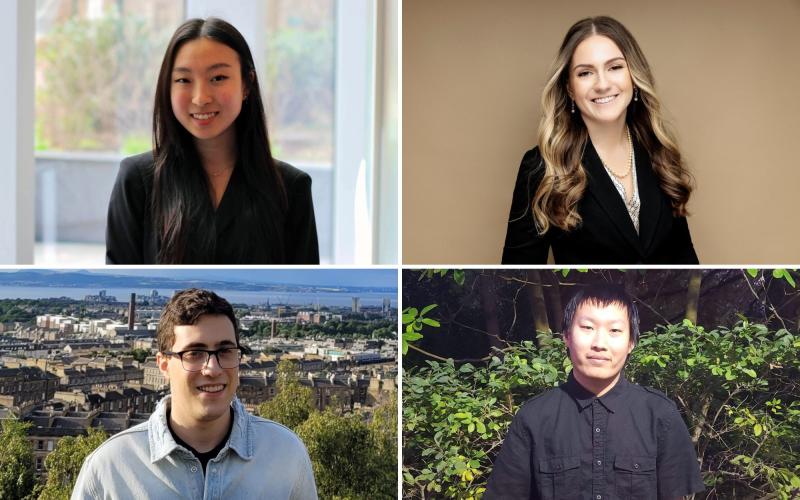
Four University of Pennsylvania undergraduates have received 2024 Goldwater Scholarships, awarded to second- or third-year students planning research careers in mathematics, the natural sciences, or engineering.
Penn’s 2024 Goldwater Scholars are third-years Hayle Kim, Eric Myzelev, and Eric Tao in the College of Arts and Sciences, and Kaitlin Mrksich in the School of Engineering and Applied Science.
They are among the 438 students named 2024 Goldwater Scholars from 1,353 undergraduates students nominated by 446 academic institutions in the United States, according to the Barry Goldwater Scholarship & Excellence in Education Foundation. Each scholarship provides as much as $7,500 each year for as many as two years of undergraduate study.
The students applied for the Goldwater Scholarship with assistance from Penn’s Center for Undergraduate Research and Fellowships. Penn has had 63 Goldwater Scholars named since Congress established the scholarship in 1986 to honor U.S. Senator Barry Goldwater.
Kim, from Knoxville, Tennessee, is majoring in neuroscience. She works in the lab of Matthew Kayser at Penn Medicine, where she studies the molecular basis of sleep maturation using Drosophila melanogaster as a model organism. At Penn, Kim is the co-founder and co-president of the undergraduate chapter of the Asian Pacific American Medical Student Association, and was the internal vice president of the Penn Korean Student Association. She is a teaching assistant for the course Chronobiology and Sleep taught by David Raizen, professor of neurology, and has been a learning assistant and peer tutor for general chemistry. Kim is a University Scholar and CURF Research Peer Advisor. She volunteers for the nonprofit One House at a Time in its Beds for Kids program, and in the emergency department of the Children's Hospital of Philadelphia. After graduating, Kim plans to pursue an M.D./Ph.D. in neuroscience.
Mrksich, from Hinsdale, Illinois, is majoring in bioengineering. She is interested in developing drug delivery systems that can serve as novel therapeutics for a variety of diseases. Mrksich works in the lab of Michael J. Mitchell where she investigates the ionizable lipid component of lipid nanoparticles for mRNA delivery. At Penn, Mrksich is the president of the Biomedical Engineering Society, where she plans community building and professional development events for bioengineering majors. She is a member of the Kite and Key Society, where she organizes virtual programming to introduce prospective students to Penn. She is a member of Tau Beta Pi engineering honor society, and the Sigma Kappa sorority. She also teaches chemistry to high schoolers as a volunteer in the West Philadelphia Tutoring Project through the Civic House. After graduating, Mrksich plans to pursue an M.D./Ph.D. in bioengineering.
Myzelev, from Toronto, is majoring in mathematics, with a minor in computer and information science, and is submatriculating for a master’s degree. His research interests include algebra, combinatorics, and using deep learning to solve partial differential equations. Myzelev has worked on numerous research projects in combinatorics and deep learning, has both a co-authored publication and an accepted paper, and has presented his work at several international conferences. Myzelev has been a research assistant for Sasha Indarte, assistant professor of finance at the Wharton School, using recurrent neural networks to identify racial biases in personal bankruptcy outcomes, and he was an intern with the Penn Wharton Budget Model. He is a problem writer for the Canadian Astronomy and Astrophysics Olympiad and an event supervisor for Science Olympiad at Penn. After graduating, Myzelev plans to pursue a Ph.D. in math and research algebraic geometry and combinatorics.
Tao, from Wallingford, Pennsylvania, is majoring in cognitive science, mathematics, and logic, with a focus on language and the mind. They are interested in related fields including physics, linguistics, and logic. Tao studies the neuroscience of social behavior under Marc Schmidt, professor of biology, using multimodal mating displays in the brown-headed cowbird as a model system. Tao co-founded the Penn Math Contest to promote enthusiasm for mathematics among high schoolers, and volunteers with similar organizations such as Science Olympiad at Penn. Tao also works as a teaching assistant in Penn’s Mathematics Department. After graduating, Tao plans to pursue a graduate degree in computational neuroscience.
Related Articles
Two Penn students awarded a 2024 Paul & Daisy Soros Fellowship for New Americans
04/17/2024
Min Jae Kim is pursuing an M.D./Ph.D. in the Perelman School of Medicine, and Zijian (William) Niu is a fourth-year in the College of Arts and Sciences.
Penn team of four undergrads awarded the Davis Projects for Peace grant
04/15/2024
The College of Arts and Sciences students lead a community health care project in Philadelphia.
Two Penn students awarded Truman Scholarships
04/12/2024
Third-year students Aravind Krishnan and Tej Patel are both in the Vagelos Program in Life Sciences and Management.